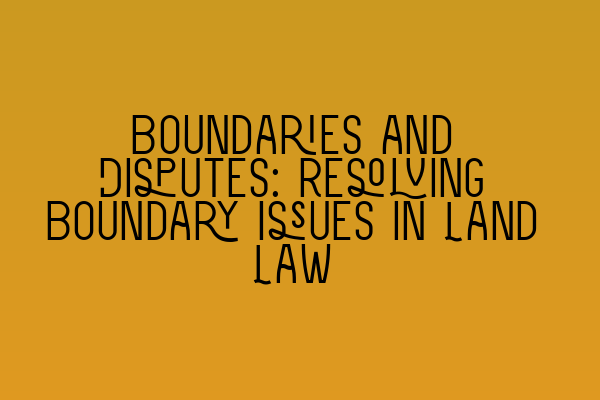Boundaries and Disputes: Resolving Boundary Issues in Land Law
Welcome to the SQE Property Law & Land Law blog! In this post, we will delve into the complexities of boundaries and disputes in land law, and explore the various methods available to resolve boundary issues. Whether you are a property owner, a solicitor, or a student preparing for the SQE exams, understanding the intricacies of boundary disputes is crucial in ensuring the smooth transfer and enjoyment of land rights.
The Importance of Accurate Boundaries
Accurate boundaries are essential for the proper delineation of land ownership. They play a pivotal role in determining the extent of an individual’s property rights and obligations. When boundary disputes arise, they can lead to significant legal complexities, financial costs, and emotional stress.
As a property owner, it is crucial to be aware of any potential boundary issues to safeguard your property rights. Likewise, as a solicitor or legal professional, you have the responsibility to help clients navigate and resolve boundary disputes effectively.
Common Causes of Boundary Disputes
Boundary disputes can arise due to various reasons, including:
- Inaccurate or outdated land registry plans
- Lack of clear documentation
- Unclear or poorly defined boundaries
- Misinterpretation of title deeds
- Encroachment onto neighboring land
- Disagreements over maintenance responsibilities
- Boundary changes caused by natural or man-made events
Resolving boundary issues requires a thorough understanding of land law and the application of legal principles to the specific circumstances of each case. To gain a comprehensive understanding of land law concepts and principles, consider enrolling in our SQE 1 Preparation Courses. These courses will provide you with the knowledge and skills necessary to succeed in the SQE exams.
Methods of Resolving Boundary Disputes
Resolving boundary disputes can be achieved through various methods, including:
1. Negotiation and Mediation:
The first step in resolving a boundary dispute is to attempt negotiation or mediation. This involves engaging in open and constructive discussions with the neighboring property owners to find a mutually acceptable solution. Mediation can be a cost-effective and efficient way of resolving disputes without resorting to litigation.
If you are preparing for the SQE exams and looking for practice questions to enhance your understanding of negotiation and mediation, check out our SQE 1 Practice Exam Questions.
2. Boundary Agreement:
If the parties are able to reach an agreement, a boundary agreement can be drafted and registered with the Land Registry. This agreement will be binding on all future owners and can help prevent future boundary disputes.
3. Expert Boundary Survey:
When the dispute cannot be resolved through negotiation or mediation, it may be necessary to hire an expert boundary surveyor. A boundary survey involves conducting a detailed analysis of the survey maps, title deeds, physical features, and historical evidence to determine the precise location of the boundary.
With our SQE 2 Preparation Courses, you will gain the necessary skills to navigate complex land law cases and effectively utilize expert reports and survey findings to support your client’s position.
4. Alternative Dispute Resolution:
If negotiation, mediation, or expert survey fail, alternative dispute resolution methods such as arbitration or adjudication can be pursued. These methods involve appointing a neutral third party to make a binding decision on the boundary dispute.
5. Litigation:
As a last resort, litigation can be pursued to resolve boundary disputes. This involves initiating court proceedings and presenting the dispute before a judge. Litigation can be a lengthy and costly process, and it is essential to have strong legal representation to navigate the complexities of land law in court.
Conclusion
Boundary disputes can be complex and challenging, requiring a deep understanding of land law principles and effective dispute resolution strategies. Whether you are a property owner, a solicitor, or a student preparing for the SQE exams, it is crucial to develop a strong foundation in land law concepts and stay updated with the latest legal developments.
At SQE Property Law & Land Law, we offer comprehensive SQE 1 and SQE 2 Preparation Courses to help you master the nuances of land law and succeed in the SQE exams. Additionally, be sure to check out our SQE 1 Practice Mocks FLK1 FLK2 for additional practice and assessment.
For more information on SQE exam dates, visit our page on SRA SQE Exam Dates. Remember, a solid understanding of boundaries and dispute resolution in land law is key to your success in this field. Stay informed, stay prepared, and feel free to reach out to our expert team at SQE Property Law & Land Law for any further assistance.
